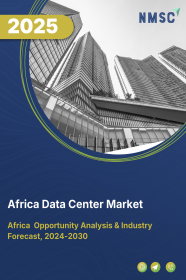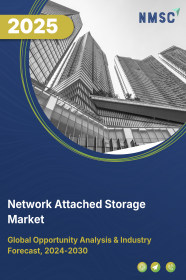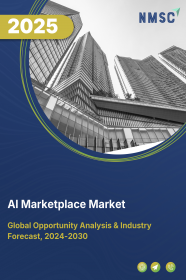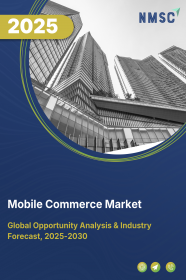
Africa Data Center Market by Component (Hardware, Software, Service), by Type (Colocation, Hyperscale, Edge, Other Types), by Deployment Model (On-Premises, Cloud, Hybrid), by Tier Standard (Tier 1, Tier 2, Tier 3, Tier 4), by Energy Requirement & Power Density (Low Power, Medium Power, High Power), by Cooling Techniques (Air Cooling, Liquid Cooling, Others), by Enterprise Size (Large Enterprises, Others), by End User (BFSI, Other End Users)– Opportunity Analysis and Industry Forecast, 2024–2030
Industry: ICT & Media | Publish Date: 23-Apr-2025 | No of Pages: 274 | No. of Tables: 210 | No. of Figures: 135 | Format: PDF | Report Code : IC2447
US Tariff Impact on Africa Data Center Market
Trump Tariffs Are Reshaping Global Business
Africa Data Center Market Overview
The Africa Data Center Market size was valued at USD 1.76 billion in 2023, and is predicted to reach USD 3.13 billion by 2030, at a CAGR of 8.6% from 2024 to 2030. The Africa data center market, also known as the network infrastructure market, covers the entire lifecycle of specialized infrastructure for hosting computing systems, from initial planning and construction to ongoing operation and maintenance. This market includes a variety of components such as servers, storage systems, and networking equipment, that together provide services such as cloud computing and connectivity solutions.
Currently, the industry is experiencing widespread adoption of cloud services and the rise of edge computing aimed at reducing latency. Key trends shaping the market include a strong emphasis on sustainability, increased cybersecurity concerns, the integration of hybrid and multi-cloud approaches, and the growing influence of 5G networks. These trends highlight the industry's proactive efforts to meet the rising demand for scalable, efficient, and secure data processing and storage solutions amid the ongoing digital transformation. According to projections by the United States International Trade Commission, the data processing and storage market is expected to grow from USD 56 billion in 2020 to USD 90 billion by 2025.
Rapid Digitalization Significantly Boosts the Market Growth
Africa, comprising countries such as South Africa, Nigeria, and Kenya, is undergoing a transformative evolution in its data center landscape, fuelled by the continent's increasing digitalization, economic growth, and the demand for reliable digital infrastructure. While Africa is still emerging as a network infrastructure hub compared to other regions, significant developments are underway in several countries.
South Africa, leading the charge in the African network infrastructure market, is experiencing substantial growth driven by the expansion of the country's digital economy. With 61 operational network infrastructure, cities such as Johannesburg and Cape Town emerged as focal points for network infrastructure investments, reflecting the region's growing importance in the global digital ecosystem.
Government Initiatives is Propelling the Growth of the Market
The South African government's initiatives to promote digital inclusion and support the growth of the technology sector are contributing to the positive trajectory of the network infrastructure industry. Positioning itself as a gateway for digital business in Africa, South Africa's network infrastructure market is expected to play a pivotal role in supporting the nation's digital transformation. Similarly, Nigeria, a critical player in West Africa, is witnessing a burgeoning network infrastructure market.
With 11 operational network infrastructure, cities such as Lagos and Abuja are emerging as crucial locations for network infrastructure infrastructure. Government initiatives aimed at enhancing internet connectivity and addressing cybersecurity concerns, such as the National Digital Economy Policy Strategy (NDEPS), are driving the growth of Nigeria's network infrastructure industry. NDEPS focuses on eight pillars to reposition the Nigerian economy to harness digital technology opportunities, further fuelling the expansion of the data center market in the region.
High Initial Investment Hinders the Market Growth
The data center market faces significant hurdles, primarily due to the substantial initial investment required and stringent environmental regulations. Establishing and maintaining network infrastructure demands considerable upfront financial commitments, creating barriers for smaller enterprises and start-ups attempting to enter the market. Additionally, ongoing compliance with environmental standards necessitates continuous investment in energy-efficient technologies hinders the overall Africa data center market growth.
Integration of Edge Computing Presents Lucrative Opportunity for Market Expansion
The integration of edge computing into market operations presents promising prospects for the industry's growth. By minimizing latency and enabling real-time processing, edge computing supports applications such as the Internet of Things (IoT) and Augmented Reality (AR), reducing the load on centralized cloud data center market while providing scalability and flexibility.
This decentralized approach not only enhances security by processing sensitive data locally but also aligns with evolving digital landscapes, creating diverse opportunities for network infrastructure providers. Recent investments in start-ups such as Armada indicate the growing interest in edge computing solutions, signalling a concerted effort to address connectivity challenges and bridge the digital divide.
Competitive Landscape
The key players operating in the Africa data center industry include Digital Reality, Oracle Corporation, Vantage Data Centers, Psychz Networks, MOD Mission Critical, Cato Digital, Inc., Microsoft Corporation, Equinix, Inc., GPX Global Systems, Inc., Zenlayer, CenterServ International, Teraco Data Environments, Open Access Data Centers, PAIX Data Centers, Africa DataCenters, , Hivelocity, Inc., Vultr, NTT Global, MTN LLC, EdgeUno and others.
Africa Data Center Market Key Segments
By Component
-
Hardware
-
UPS
-
Generators
-
Transfer Switches
-
Cooling Systems
-
Computer Room Air Conditioning (CRAC)
-
Racks
-
Others
-
-
Software
-
Services
By Type
-
Colocation
-
Hyperscale
-
Edge
-
Others
By Deployment Model
-
On-Premises
-
Cloud
-
Hybrid
By Tier Standard
-
Tier 1
-
Tier 2
-
Tier 3
-
Tier 4
By Energy Requirement and Power Density
-
Low Power (Less than 20MW)
-
Medium Power (20-100MW)
-
High Power (100MW and More)
By Cooling Techniques
-
Air Cooling
-
Liquid Cooling
-
Dry Cooling
-
Immersion Cooling
-
Others
By Enterprise Size
-
Large Enterprise
-
Small and Medium Size Enterprise
By End User
-
BFSI
-
IT and Telecom
-
Government
-
Energy and Utilities
-
Other End Users
By Countries
-
South Africa
-
Nigeria
-
Kenya
-
Egypt
-
Morocco
-
Ghana
-
Other Countries
Key Players
-
Digital Reality
-
Oracle Corporation
-
Vantage Data Centers
-
Psychz Networks
-
MOD Mission Critical
-
Cato Digital, Inc.
-
Microsoft Corporation
-
Equinix, Inc.
-
GPX Global Systems, Inc.
-
Zenlayer
-
CenterServ International
-
Teraco Data Environments
-
Open Access Data Centers
-
PAIX Data Centers
-
Africa DataCenters
-
Hivelocity, Inc.
-
Vultr
-
NTT Global
-
MTN LLC
-
EdgeUno
REPORT SCOPE AND SEGMENTATION:
|
Parameters |
Details |
|
Market Size in 2023 |
USD 1.76 Billion |
|
Revenue Forecast in 2030 |
USD 3.13 Billion |
|
Growth Rate |
CAGR of 8.6% from 2024 to 2030 |
|
Analysis Period |
2023–2030 |
|
Base Year Considered |
2023 |
|
Forecast Period |
2024–2030 |
|
Market Size Estimation |
Billion (USD) |
|
Growth Factors |
|
|
Companies Profiled |
20 |
|
Market Share |
Available for 10 companies |
|
Customization Scope |
Free customization (equivalent up to 80 working hours of analysts) after purchase. Addition or alteration to country, regional, and segment scope. |
|
Pricing and Purchase Options |
Avail customized purchase options to meet your exact research needs. |

















 Speak to Our Analyst
Speak to Our Analyst





















